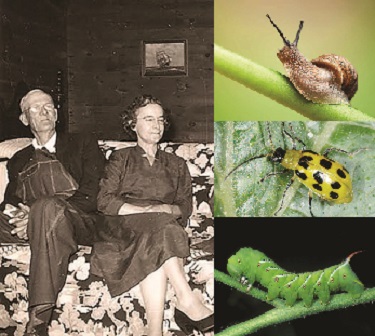By Beth Wicker
My Dad was born in a log cabin in rural Deep River, NC. His parents were sharecroppers, and the cabin was part of the farm where they sharecropped. My Grandfather, being a smart man, had married the daughter of the landowner, and eventually they inherited the farm and moved from the log cabin to the main house.
As a kid our week in Deep River in the summer was always a highlight – it was close enough to our home in Chapel Hill that Mom and Dad could drive us down, settle us in, and head home. While the main house was two stories, all I remember being used was the ground floor. My sister and I shared a big handmade feather bed on one end of the house, with my Grandmother and Grandfather in their room on the other and the sitting room in-between us. The house was the width of the room, so it had windows on three sides – I remember love running to the windows to look out in each direction.
In the Summer, the day started as the sun rose. The early 1900’s house had no air conditioning, so everyone wanted to be done with chores and back inside in the shade with the fans by late morning. Grandmother cooked breakfast on her electric stove in the summer – the wood stove was saved for wintertime when the heat it put off was welcome.
After breakfast and doing the dishes, Grandfather would head to the barn to finish the chores with the animals. Sometimes one or both of us went with him to help with the milking, collecting eggs, feeding chickens (I was always terrified as they raced at us to get the hard corn kernels as we were shelling off the stored cobs for them – I thought they might peck my eye out!), feeding the mule, and cleaning the stalls. If we were helping Grandmother, it might be in the wash house with the big tub over the fire, and then running it through the mangle machine by hand.
My strongest memories, though, are of working in the garden with her. If they wanted to eat it, they pretty much had to grow it. So, the vegetable garden was HUGE! Grandaddy would wait at the edge of the field in early spring with the mule hooked to the plow, and as soon as it was light enough, off they went to plow the rows and rows and rows that Grandmother would plant with vegetables. Beans and tomatoes and squash and cucumbers and peppers and potatoes and …and… and…
When we came to visit in the summer, part of our job was helping her pick and weed – and PEST CONTROL! I HATED it; but was simultaneously fascinated with Grandmother’s pest control. We would head out with a handmade basket to gather whatever was ripe, and a jar about half filled with kerosene – to gather pests! Grandmother would pinch the pest bug with her fingers and drop it in the kerosene to die. I never could bring myself to touch the caterpillars and beetles and various bugs. I used a stick or some leaves or a bunch of grass to knock them into the kerosene jar. Grandmother was always very understanding of her “city” granddaughter’s squeamishness!
As the day heated, we moved inside, then in the late afternoon onto the front porch that ran the length of the house where we would sit in the shade and breeze under the huge trees and shell beans and peas, or shuck the corn, or churn butter from the milk. It was a gift to see the whole cycle of where the food came from, and to understand how much work went into the food that would appear on the table at supper time.
Beth Wicker, an intern in the 2021 Master Gardener Class, lives in Montgomery. For more information on becoming a master gardener, visit www.capcitymga.org or email capcitymag@gmail.com.
 Part of the Alabama Cooperative Extension Service (ACES)
Part of the Alabama Cooperative Extension Service (ACES)
